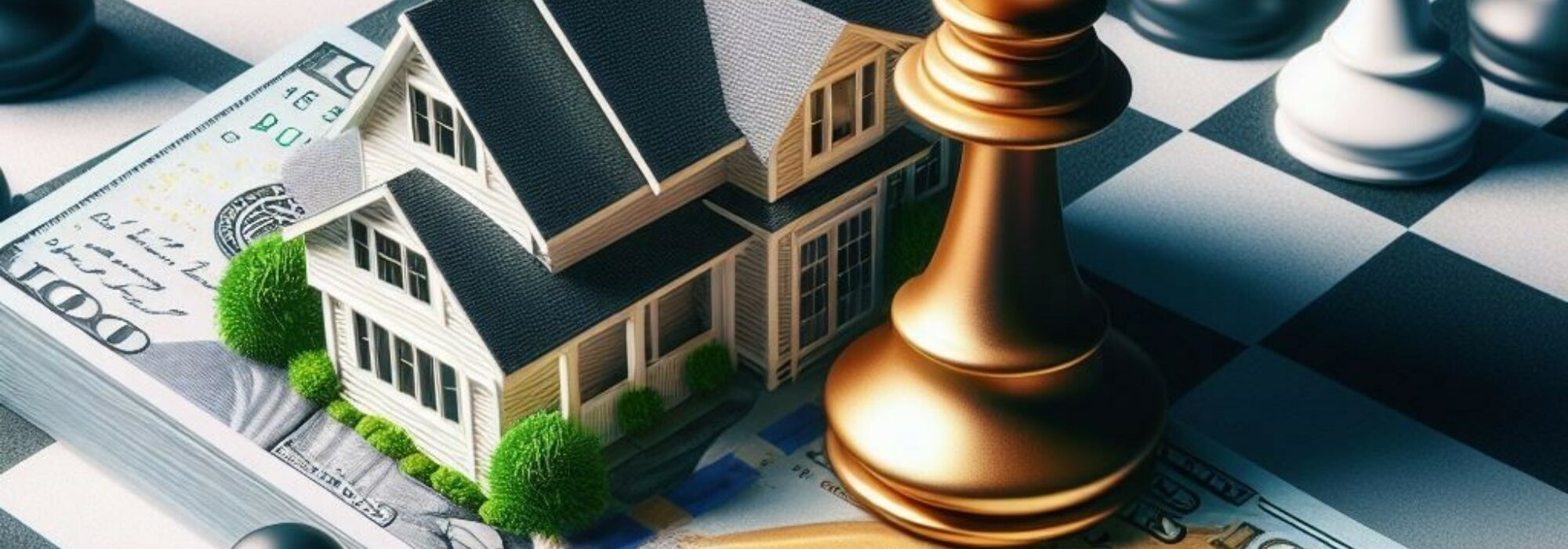Article Excerpt
Retirement planning can be a complex and strategic process, much like a game of chess. Learn more about playing your financial endgame well from Jackson Matheson, Retirement Mortgage Specialist (NMLS 1978746) for The Wood Group of Fairway.
When I was growing up, I used to play chess with my dad. One of his favorite things to do was trade queens with me early in the game. Like most dads, he loved playing mind games so every time he took my queen, he would gloat, and I would get this sinking feeling in my stomach. “How can I possibly win now?!? My best piece is gone!”
One day, I finally asked him why he wanted to take my queen knowing that he would lose his in the process. His answer was, “You need it more than I do because you think you can’t win without a queen.”
That was true. After he took my queen, my next objective was to move a pawn across the board so I could get her back. The difference between me and my dad was he understood the queen is just a chess piece, and her sole purpose is to help win the game. In chess, the only piece that matters is the king, and there are no bonus points if you still have your queen at the end. I was allowing my emotions to cause me to employ a strategy that was detrimental to the actual purpose of the game. While I was chasing this pointless objective and maneuvering my pawns in futility, my dad was working towards check mate. I tell this true and humorous childhood story to highlight a much more important and troubling reality.
Most Americans are approaching retirement the way I played chess as a kid, and they are losing.

Reading the Financial Chess Board
Retirement planning is inherently emotional, focusing on topics such as money, mortality, and family legacy. To make a good financial decision, you must be able to hold those emotions and still account for planning horizon, risk tolerance, and opportunity costs in pursuit of your financial goals. If we think about financial planning like chess, we remove mystique, emotion, and simplify the problem.
As a chess player, we have six different types of pieces at our disposal. These chess pieces can all do different things but ultimately, they should be used in synchrony to capture the opponent’s king and defend our own king. Remember, the most powerful piece on the board is the queen, but the most important piece is the king.
In financial planning, there are many different “chess pieces” available: various types of insurance, estate planning, IRAs, 401(k)s, social security, pensions, annuities, bonds, etc. The amount of money stored in each of these vehicles tells you which chess pieces they are.
It is highly probable the most expensive thing you own is your house, so my point is this: home equity is a chess piece and for about 95% of Americans, it is the queen.
For most people, home equity represents more than half of their net worth, and even for the very affluent ($10 million or less), it still represents a quarter of their net worth. Very few Americans have access to a bigger bucket of money than what is represented by their primary residence and most of them are so focused on protecting their queen, they risk losing the game.
Understanding the Queen's Power
Why are so many Americans reluctant to use home equity as part of their retirement plan? There are several reasons, but the biggest one is many seniors simply do not know how it can be done nor do they understand the reasons why it would make sense.
There is a little-known product in the lending industry called a Home Equity Conversion Mortgage (HECM). The HECM is a loan product insured by the Federal Housing Administration (FHA), designed for retirees to have access to both their physical home and the equity represented in it. To be eligible for a Home Equity Conversion Mortgage, you must be at least 62 years old, occupy the home as your primary residence, pay your taxes, insurance, and maintain the home. You also need enough equity in the home to qualify (generally 50 – 70%) but you do not need to have your home paid off entirely.
In its simplest form, a HECM is a line of credit with FHA insurance. The FHA insurance gives you and your spouse protected access to the home, protected access to the line of credit, and makes the loan non-recourse, meaning you, your estate, or your heirs will never owe more than the home is worth.* This loan is great for retirees because there is no required monthly principal and interest payment, the line of credit cannot be cancelled (provided you pay your taxes, insurance, and maintenance costs), and distributions are not taxable income. Additionally, you never lose ownership of the home so you can still sell it at any time or pass the property on to your children. You are not required to take funds from the line of credit and only the funds utilized will accrue interest. The vast majority of retirees today who have taken advantage of this product are happy with the decision to leverage their hard-earned equity for a safer and more fulfilling retirement.
Using Your Mortgage Queen
There are infinite reasons to use this product. Just like a queen on a chess board, she can be used to play offense and attack the opposing king. She can also be used in a conservative manner to play defense and protect your own king. The way(s) you choose to employ your queen in retirement is completely up to you, but one thing is for sure – she needs to be in the game no matter what.
Here are a few of the most common ways home equity can be applied in retirement:
- an insurance policy against foreclosure
- a standby emergency fund
- a bridge asset to defer social security
- funding long term care
- funding home renovations
- senior divorce
- a hedge against sequence of returns risk
- a tax shield
- a way to free up cashflow in your monthly budget (if you are still making a traditional mortgage payment)
There is no right answer for how or why you choose to employ your queen in retirement, but there is no question you will have a better retirement with her.
Many studies completed by Dr. Wade Pfau, Dr. Barry Sacks, and other well-respected academics demonstrate the benefits of using home equity in retirement. Their reports consistently show the retirees who utilize a HECM tend to greatly outperform those who do not, and those who neglect this tool in retirement have a much lower probability of success. At the end of the day, a Home Equity Conversion Mortgage gives you control of your biggest bucket of money and many smart retirees have already started taking advantage of it.
In summary, if a large portion of your net worth is represented by your primary residence, it may benefit you tremendously to consider using home equity in retirement. Remember, this is not a magic bullet that will make all your problems go away. A HECM should not be utilized in a vacuum, just like the queen is not the only piece you move on a chess board. It does have the ability to be a significant asset, and perhaps even a focal point, of your retirement plan. You earned the equity in your home just like you earned the money in your other retirement accounts. This product can greatly increase your chances of having a successful retirement, improve your peace of mind, and help you to retire with dignity.
Over the next decade, more and more seniors will grasp the benefits of this product and start utilizing their queen to increase their legacy and dominate retirement. Are you going to be one of them?
Disclaimer: This advertisement does not constitute financial advice. Please consult a financial advisor regarding your specific situation.
* There are some circumstances that will cause the loan to mature and the balance to become due and payable. Borrower is still responsible for paying property taxes and insurance and maintaining the home. Credit subject to age, property and some limited debt qualifications. Program rates, fees, terms and conditions are not available in all states and subject to change.




